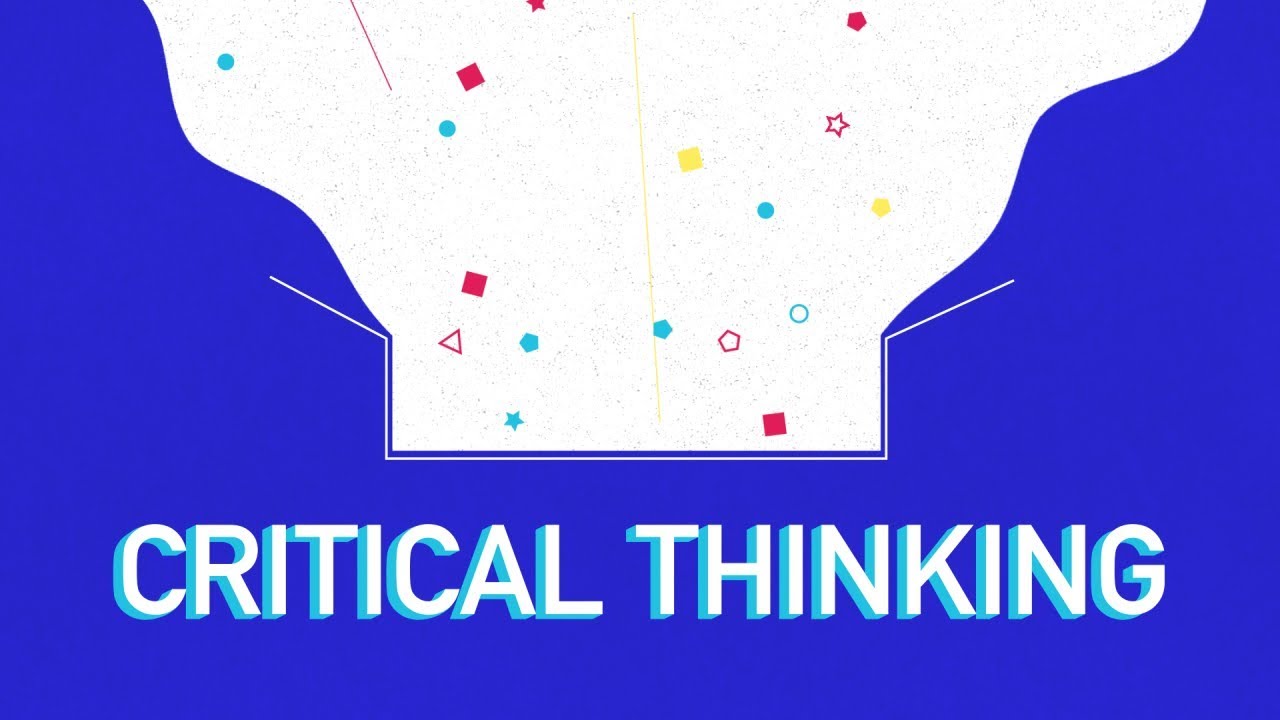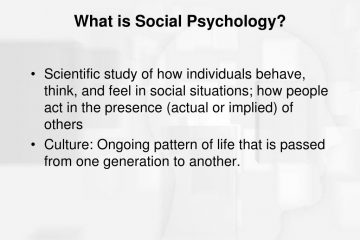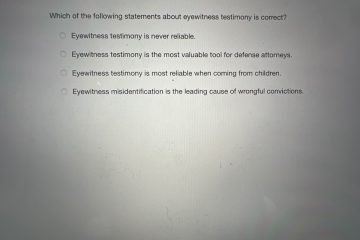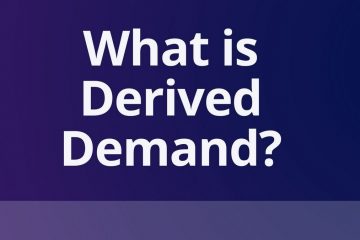Critical thinking means making judgments based on ________________.

Critical thinking means making judgments based on ________________.
A) emotion
Elevate Your Writing with Our Free Writing Tools!
Did you know that we provide a free essay and speech generator, plagiarism checker, summarizer, paraphraser, and other writing tools for free?
Access Free Writing ToolsB) keeping a closed mind
C) reason and logical evaluation
D) authority and expertise
Answer: C) reason and logical evaluation
Define critical thinking
Critical thinking is the ability to think about information and facts, judge their value, and make decisions. It’s a willingness to re-examine any beliefs or assumptions that you may have. Critical thinking is necessary for problem-solving, decision-making, and creative expression. It includes weighing evidence provided by different sources and coming up with conclusions that are soundly reasoned and supported by facts.
Critical thinking is the highest form of learning that a person can achieve. It enables a person to think critically and evaluate information, especially when it is presented to them in biased ways.
Critical thinking means taking responsibility for one’s own beliefs, making evidence-based decisions, and understanding the valid claims of others. Critical thinking is not a separate discipline from any other field, but it is essential in all areas of life and involves all kinds of learning, personal, societal, and cultural as well as educational.
Critical thinking is a common topic for many students taking psychology. Sometimes students have a hard time writing essays on different psychology topics. However, this should not be the cause of your academic stress because you can seek help from a reputable psychology essay writing service from Gudwriter that will help you tackle all your psychology assignments.
Characteristics of Critical Thinking
Critical thinking includes several characteristics and skills. Some of them are:
1. Asking questions
Critical thinking involves asking questions. Serious questions can lead to discoveries that improve one’s life, but asking the wrong question or not asking at all is a common pitfall. The purpose of questions is to explore the unknown, clarify issues, and evaluate information. Critical thinking is necessary because of the complexity and subtlety of modern life. In addition to helping us understand our world, it helps us make sense of what we learn in school and from the media.
2. Defining a problem
Critical thinking involves defining a problem and determining the best solution. It means understanding the purpose of an issue and connecting it to other interests. It also involves recognizing what are unrealistic expectations, questions that could lead nowhere, or limiting thinking about an issue.
3. Examining evidence
Critical thinking requires evaluating evidence and making judgments about what it means. It involves recognizing the difference between good and bad evidence, along with considering the strengths and weaknesses of each piece of evidence. Critical thinking is a decision-making process that helps you decide if the information is reliable, relevant, or something is missing. It also involves asking why certain evidence is more important to evaluate than other pieces of information.
4. Analyzing assumptions and biases
Critical thinking also involves analyzing assumptions and biases. It means understanding what your own biases are and how to make decisions that can help you reach a rational conclusion. Critical thinkers recognize their own limitations regarding time and energy, as well as the need for external information.
5. Avoiding emotional reasoning
Critical thinking is based on using reason and evidence in making judgments. It is important to avoid emotional reasoning and avoid falling prey to myths or false beliefs. Emotional reasoning is a mistake whereby people make decisions based on their emotions instead of facts and logic. Critical thinkers recognize that their emotions can affect judgment, but they apply their intellects to the task at hand, rather than allowing their emotions to distort the issue in question. Persons who make this mistake are more likely to accept the opinions of other people, even when these opinions are irrational.
6. Avoiding oversimplification
Critical thinking is also related to avoiding oversimplification. This means taking into account the many factors that go into a problem, rather than considering only a few. To oversimplify an issue is to ignore all but one of its aspects or variables, which may often result in reaching an unsubstantiated conclusion.
The role that logic plays in critical thinking
Logic is a key component of critical thinking. Since no one is perfect and personal biases exist, people who think critically understand the need for logic to support their conclusions. People who use logic in their reasoning and argumentation are more likely to be open-minded and to listen to opposing points of view than those who don’t.
Critical thinkers try to apply logic when they evaluate information, make decisions, or present their arguments. Logic is what separates critical thinking from wishful thinking, where one uses his or her emotions in place of logic. Critical thinkers are concerned with the truth, and they seek it logically by investigating various alternatives and considering all possibilities.
How both critical and creative thinking skills can be used to problem-solve
Critical thinking is a useful way of looking at the world, but it can also be an effective way of problem-solving. Critical thinking skills are useful in making decisions about any topic. They can help a person recognize the limitations of information and establish their assumptions about what the information means, which may lead to a more creative approach to exploring the issue at hand.
Critical thinking is developed through reading and reflecting on information, organizing thoughts into meaningful patterns, and evaluating evidence by thoughtfully examining its relevance, strengths, and weaknesses.
How can critical thinking skills be used to evaluate information
Since the beginning of the information age, people have relied on the internet for just about any piece of information that can be found. The internet is a valuable tool for reference, but it also comes with its own set of problems because it is made up of random pieces of information that were added by whatever source. This means that there is no set organization when exploring a topic. Critical thinking skills help evaluate information from any source because it helps apply logic to disagreement and figure out which pieces of “evidence” are valid and which ones are not.
Strategies for Developing Yourself as a Critical Thinker
1. Don’t believe everything you are told
Learning critical thinking skills is the first step in developing your own version of critical thinking, as well as recognizing what is true and what is not. This involves learning to identify the facts about an issue and determine how reliable these facts are. For this reason, you mustn’t just believe everything you’re told. The biggest problem with stopping to think critically about everything you hear is that it can make you a “skeptical” person who doesn’t trust others or rely on the information they provide him or her with.
2. Don’t believe everything you think
Critical thinking is more than just analyzing the information you receive. Critical thinking requires you to look at your own thoughts and feelings as well. This means that you need to avoid falling prey to your own bias, otherwise known as your “intellectual blind spots”. Intellectual blind spots are just as bad as other types of biases because they hinder a person’s ability to be objective.
3. Do deeper research
One of the first things that you do when you’re trying to learn about something is researching it. This involves reading articles, looking up references, and reviewing supporting documents as well as resources. The key to this is doing research from multiple viewpoints and evaluating all of the evidence. This can help you develop your own critical thinking skills while also learning more about various subjects.
4. Evaluate your work
Once you’ve finished your research, you can start looking at how to evaluate the evidence that you’ve gathered. Critical thinking involves analysis, this process of evaluating information is a way of developing your own critical thinking. The more evidence that you analyze, the better you get at analyzing it. The process of analysis is just as important as anything else when it comes to critical thinking because it helps a person turn his or her thoughts into actions and see that there are consequences to specific actions and behavior.
Critical thinking involves critical analysis (looking at the facts), thoughtful analysis (thinking about what you think), and logical conclusions.
The three main skills that are necessary for effective critical thinking are the ability to apply logic and reasoning, to be attentive to detail, and the ability to recognize your own biases. The further your knowledge develops, the more you will see that there is a whole process involved in developing your complete critical thinking skills. These will involve using all of your senses as well as developing both creative and critical thinking skills.
More psychology questions
- The scientific study of how individuals behave, think and feel in social situations is known as
- Which of the following statements about eyewitness testimony is correct?

Special offer! Get 20% discount on your first order. Promo code: SAVE20


